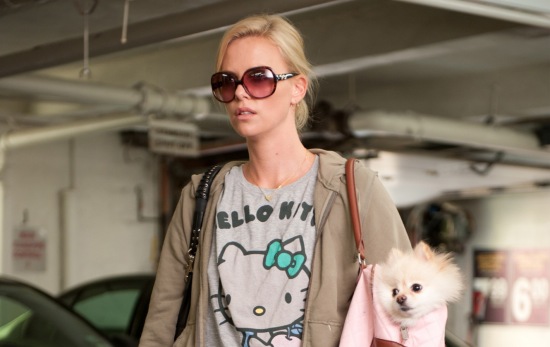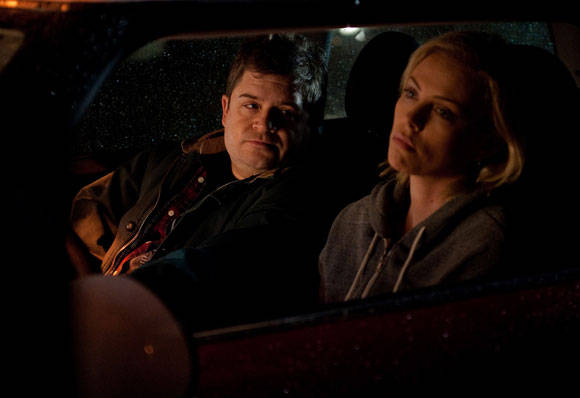|
Young Adult
Reviewed
by
Damien Straker on
February 1st,
2012
Paramount Pictures presents
a film directed by
Jason Reitman
Screenplay
by
Diablo Cody
Starring:
Charlize
Theron, Patton Oswalt, Patrick Wilson and
Elizabeth
Reaser
Running
Time:
94 mins
Rating:
MA
Released:
January 19th,
2012
|
8/10
|
|
After a hard night of drinking, a ghostwriter named
Mavis
(Charlize Theron) wakes up alone in the mess of her Minneapolis
apartment. While
working on her fading young adult book series, she opens an email and
finds
that a picture of a baby has been forwarded from a friend. The baby
belongs to
her old flame Buddy (Patrick Wilson), who is now happily married to
Beth
(Elizabeth Reaser) but still living in their old suburban hometown of
Mercury.
Mavis decides that since her marriage was such a failure, she is going
to
return to Mercury to try and win Buddy back, regardless of his own
commitments
and relationships. When Mavis arrives she finds that the town and
people's
attitudes have changed. At a local bar Mavis meets Matt (Patton
Oswalt), who
used to go to high school with her. He walks with a cane since he was
mistakenly the target of a gay bashing when they were young. Matt tries
to talk
some sense into Mavis but nothing will deter her from her plan to win
Buddy's
heart again.

Young Adult is a 'bad girl' movie done right. There has been a steady
increase
in the number of films featuring women behaving badly. It is now
considered
politically correct and bankable for women to be as gross and as
puerile as men
in movies. Some achievement. Yet in the hands of Jason Reitman, an
effortlessly
talented director, and his screenwriter Diablo Cody, Young
Adult is far more sophisticated and entertaining. Reitman and
Cody, having worked together on Juno,
are an exciting partnership. They have great minds for suburban details
and a
concern for stasis as a central theme. At the core of this film is an
impeccably detailed screenplay and one that is comprehensively
photographed by
Reitman. In the opening scenes he shoots from a wide angle in the
apartment
room. He has acute vision for everyday life, making sure that we see
the unmade
bed, the mess on the floor and the empty bottles of wine by the
bedside. The
mise-en-scene all attributes to building this self-destructing
character. Look
at how drab and grey the colours in the room are. It makes us share
Mavis'
sense of disconnection from the world. Similarly, over the course of
the film
she moves from one enclosed space to another, including her apartment,
her
hotel room and her little mini cooper. The specificity of these
insulated
spaces means that she is cut off from any true emotional contact from
other
people and why she is so heartless. Also consider the relevance of the
runny
picture of the baby she prints off. Its distorted, which is reflective
of her
view of other people's happiness. Stasis is further represented through
some
clever sound and vision as Mavis continually plays the song she shared
with
Buddy over and over again. Reitman cuts to the inside of the rotating
track to
show his protagonists circular lifestyle.

Although there is a nasty protagonist at the centre of
this story,
the film itself cannot be judged accordingly. The tone here is perfect
because
despite dealing with physical and mental pain, the film is balanced
with its
humour and its reasoning. Much of this is supplied by Patton Oswalt,
who makes
Matt sensible but also funny and gently self-pitying. He's a great
counter to Mavis'
madness and yet just like her he is hung up on the past, albeit with
more
understandable pain. I love the attention given to his inner life, like
how he
lives with his sister, brewing alcohol in his garage but also building
and
painting action figurines. It is a clever reminder of his own desire to
put his
own aching body back together again. Both he and Theron are served by
some
outstanding, colourful dialogue, courtesy of Cody, who has relaxed a
lot of her
flashier jargon from Juno. Matt has
an absolute gem when Mavis poses who is going to make the first move
between
herself and Buddy. He says: "I think that's going to be...you". The
way he holds that line up is perfect comic timing. But the film really
belongs
to Theron who has so much fun defining this character with her slumped
shoulders, eye rolling and baggy tracksuits. She ensures that every
line of
dialogue is loaded with feeling and disillusionment, whether it's her
teenage-like sarcasm, her rehearsed lines that she overhears from kids
talking,
or simple disdain for the people in the town. There's a lot of anger in
this
performance too though. One close up shot of her face in a bar is so
venomous
that its focus becomes haunting. This is
true to the film's lack of sentimentality because there is no
predictable
transformation. At most, we linger over a touching moment of two
characters
mutually understanding each other's grief in the most subtle and human
way. By
contrast, the ending that follows is problematic because although there
are
changes, we're still not sure what, if anything, has been learnt. I
told you
she was a bad girl.
|